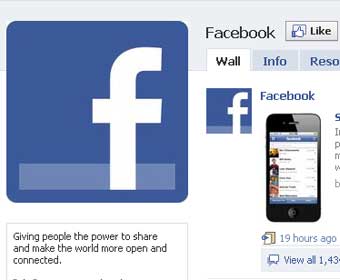Facebook pips Apple with launch of Messenger
Facebook has taken the wraps off Facebook Messenger, a separate mobile messaging application which has been developed by the same team that developed the Beluga group messaging application (Facebook acquired Beluga in Mar. 2011). Facebook Messenger will compete with BlackBerry Messenger and Apple’s forthcoming iMessage, in that it will provide a messaging-over-IP (MoIP) capability. However, Facebook Messenger will have the edge over both RIM and Apple in that it can provide a cross-platform messaging application, specifically for the iPhone and Android mobile operating systems, and so it will therefore also compete against applications such as WhatsApp and KakaoTalk. Facebook has stated that it is also developing Facebook Messenger for the BlackBerry.
August 15, 2011

By Pamela Clark-Dickson
Facebook has taken the wraps off Facebook Messenger, a separate mobile messaging application which has been developed by the same team that developed the Beluga group messaging application (Facebook acquired Beluga in Mar. 2011). Facebook Messenger will compete with BlackBerry Messenger and Apple’s forthcoming iMessage, in that it will provide a messaging-over-IP (MoIP) capability. However, Facebook Messenger will have the edge over both RIM and Apple in that it can provide a cross-platform messaging application, specifically for the iPhone and Android mobile operating systems, and so it will therefore also compete against applications such as WhatsApp and KakaoTalk. Facebook has stated that it is also developing Facebook Messenger for the BlackBerry.
Assuming that Facebook Messenger provides a compelling messaging experience, it has the potential to achieve a greater reach than BBM, WhatsApp, KakaoTalk or the as-yet-unlaunched iMessage. According to Facebook, it has more than 250 million active mobile users, and these users are twice as active as non-mobile users of Facebook. In addition, the company has partnerships with 200 mobile operators in 60 countries.
This larger addressable market is a key differentiator between Facebook and other messaging application providers. Facebook already has a massive installed base of users, on both the mobile and the PC, to which it can promote Messenger, which will be available to subscribers to download for free.
The company says the overall Facebook messaging experience will be faster with the Messenger application, which will definitely be seen as an advantage by Facebook Mobile users who are also heavy users of Facebook Messages. Facebook Messenger will also enable “free” messaging (over IP), group messaging (courtesy of Facebook’s acquisition of Beluga), and integration with the phone’s address book so that Facebook Messenger users can send messages to non-Facebook Messenger users via SMS.
Facebook Messenger’s integration with Facebook Messages and the phone address book, and its inclusion of Beluga’s group messaging capabilities, gives it a potential edge over the other messaging applications, and may be a key factor in inducing either churn among the existing users of these applications, or in encouraging adoption by new users.
One potential drawback of Facebook Messenger is that Facebook Mobile users will have to download and install Messenger as a separate application on their smart-phones. The application may not be appealing enough for existing Facebook Mobile users to do that en masse. Even though Facebook does have the advantage of a significant installed base of mobile users, it will face the same challenges as its competitors with regards to growing the penetration of Facebook Messenger.
With regards to Facebook’s mobile operator partners, these will likely also benefit from the way in which the new Messenger application will work, in that messages will continue to be delivered via e-mail notifications and texts. That means that the mobile operators will still generate data and SMS traffic, and revenues, from their subscribers’ use of the Messenger application. In order to use Facebook Messenger, mobile users will need to have a smart-phone, a mobile data plan and a messaging plan with their operator. Facebook Messenger may well be a factor that encourages mobile subscribers to upgrade their devices and plans.
As to whether Facebook Messenger will have a significant impact on carriers’ SMS traffic and revenues, it’s too soon to tell. While the penetration of smart-phones (which enable applications) is growing quickly, all devices enable SMS, and it is the ubiquity of SMS and its interoperability across networks and devices that will ensure that SMS continues to play a key role as a messaging bearer.
It is also possible that Facebook Messenger may help Facebook to shift the cost of SMS notifications and messages in markets outside of the US at least, back onto the mobile user. Facebook has not revealed the commercial arrangements that exist between it and its 200 or so carrier partners, but Informa believes that the company is probably bearing the cost of SMS notifications, buying SMS at wholesale rates either directly from the carriers or from a messaging transactions network. If Facebook Messenger requires users to pay to send SMS messages to non-Facebook Messenger users, then that is a cost that Facebook no longer has to bear, and it is also retail (rather than wholesale) revenue for the carrier.
It is possible that Facebook Messenger will contribute to the cannibalization of mobile operators’ SMS traffic and revenues, but it may also, perversely, contribute to the growth in mobile operators’ SMS traffic and revenues, because Messenger users will be able to send SMSes to their phonebook contacts from within the application.
Without doubt, Facebook Messenger has immediately become a leading contender in the mobile messaging applications market. Indeed Apple may already be too late, with iMessage. The smaller start-ups will find it difficult to compete without some significant differentiation. BBM will continue to thrive, but remain niche. Carriers are the only other players for whom Facebook Messenger does not necessarily represent a significant threat. Informa believes that this is because Facebook understands that it needs to work with the carriers in order to reach its customers on mobile.
Read more about:
DiscussionYou May Also Like









_1.jpg?width=700&auto=webp&quality=80&disable=upscale)


.png?width=800&auto=webp&quality=80&disable=upscale)